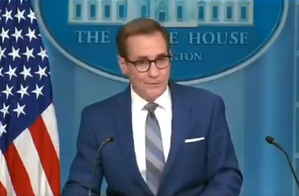America
US Voices Concern Over Rising Middle East Conflict Risks

Aug 2 :
In response to the threats of revenge against Israel following the killing of Hamas leader Ismail Haniyeh in Iran, the White House expressed alarm on July 31 about the increased likelihood of a wider Middle East war. However, White House national security spokesman John Kirby told reporters that the administration is not expecting or planning for a full-scale war in the region and is doing everything it can to keep one from breaking out.
According to Kirby, "the task of achieving that outcome certainly doesn't get easier" when there are occurrences, whether they are dramatic or violent, and they are triggered by whatever actor. Despite worries that the endeavor had taken a major hit, he insisted that the United States still thought there was a "viable" approach to end the nine months of conflict in the Gaza Strip between Israel and Hamas.
His murder was verified by both the Islamic militant party Hamas of Palestine and the Revolutionary Guards of Iran. Haniyeh had taken part in indirect talks for a Palestinian enclave ceasefire that had been mediated by Western mediators. According to the Guards, it happened just hours after he was sworn in as president of Iran. No official statement was made by the government of Prime Minister Benjamin Netanyahu claiming responsibility. The Israeli prime minister gave a televised statement in which he promised a strong response to any aggression, but he made no reference to Haniyeh's death. Instead, he emphasized that Israel had recently dealt heavy blows to Iran's proxies, such as Hezbollah and Hamas.
Less than twenty-four hours prior to the killing, in response to a fatal rocket attack in the Israeli-occupied Golan Heights, Israel asserted that it had eliminated Hezbollah's senior military commander in Beirut, the capital of Lebanon. "Our goal is to prevent any further escalation," Kirby stated. "Those dangers fluctuate daily. They are definitely up at the moment. They do nothing to simplify the objective of de-escalation, deterrence, and dissuasion.
While denying knowledge of Haniyeh's demise, Kirby cited remarks made by Ayatollah Ali Khamenei of Iran. After Israel justified "harsh punishment for itself," the Supreme Leader declared that Tehran must exact revenge for Haniyeh's murder. Earlier in the Gaza War, which began on October 7th in response to a cross-border offensive on Israel by Hamas, Iranian soldiers attacked immediately.
When asked whether the United States was advising Israel to exercise restraint, Kirby remained mum. According to Kirby, there are still signs that the process is not completely derailed, even though recent developments have cast doubt on the possibility of an immediate truce deal in Gaza.
"We continue to hold the belief that the current agreement is worthwhile," he emphasized. American Secretary of State Antony Blinken avoided discussing the murder of Haniyeh at a Singapore event, instead focusing on the importance of a Gaza truce in preventing a regional war. According to his interview with Channel News Asia, the United States was unaware of and had no role in the murder.
While on the phone with the leaders of Qatar and Jordan, Blinken reportedly addressed regional concerns and the ongoing ceasefire negotiations in Gaza, according to the State Department. Following recent incidents in the Middle East, U.S. State Department Deputy Spokesperson Vedant Patel assured reporters that the country will do all in its power to safeguard its troops and interests there.
Amid escalating tensions between Israel and Hezbollah, a party based in Lebanon, the United States recently warned its people from visiting the country.



































